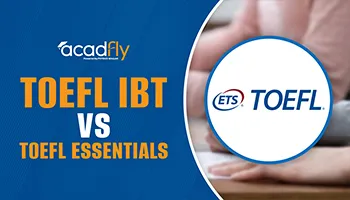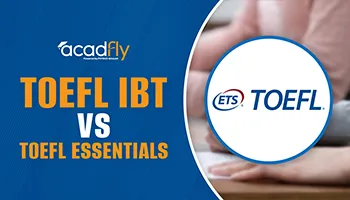


TOEFL iBT vs TOEFL Essentials: Selecting the appropriate English test is a significant decision for students. Choosing the right English proficiency test can impact your study or career path. In this guide, we compare TOEFL iBT and TOEFL Essentials, highlighting key differences, advantages, and use cases. Whether you are applying to a university, looking for a general proficiency certificate, or exploring new opportunities, we will help you make an informed decision.
TOEFL iBT vs TOEFL Essentials - Main Differences
TOEFL iBT and TOEFL Essentials are language tests. These tests assess candidates' English proficiency in reading, writing, listening, and speaking skills. Both tests have their own criteria for conducting the test.
TOEFL iBT
The TOEFL iBT (Internet-Based Test) is a leading English language exam for students who wish to study at universities in English-speaking countries. It tests your reading, listening, speaking, and writing skills using academic English. The test is about three hours long.
You can take it at an official test center or choose the TOEFL iBT Home Edition, which lets you complete the exam online from home using a computer, webcam, and stable internet. Each section is scored out of 30, with a total possible score of 120. Most universities in the US, UK, Canada, Australia, and many other countries accept TOEFL iBT scores for admission.
TOEFL Essentials
TOEFL Essentials is a newer English proficiency test designed to be shorter and more flexible. It lasts about 1.5 hours and includes questions that use both general, everyday English and academic English. The test checks the same four skills—reading, listening, speaking, and writing, but with tasks that are usually faster and simpler.
TOEFL Essentials is always taken online at home. Each section is scored out of 12, and your final score is the average of the four sections. The test is less expensive than TOEFL iBT, but not as many universities accept it. If your chosen university does accept TOEFL Essentials, it can be a more affordable and convenient option for you.
The table below shows the differences between TOEFL iBT and TOEFL
|
TOEFL iBT vs TOEFL Essentials |
||
|
Feature |
TOEFL iBT |
TOEFL Essentials |
|
Test Length |
About 3 hours |
About 1.5 hours |
|
Test Skills |
Reading, Listening, Speaking, Writing |
Reading, Listening, Speaking, Writing |
|
Test Format |
Academic and formal English |
Mix of academic and general English |
|
University Acceptance |
Widely accepted by most universities |
Accepted by some universities |
|
Price |
Around $195–$265 (varies by country) |
Around $100 |
|
Test Delivery |
Test center and Home Edition available |
Online, can be taken at home |
TOEFL iBT vs TOEFL Essentials - Fees
The fee structure of TOEFL iBT vs TOEFL Essentials also varies:
TOEFL iBT
Here is the fee structure of TOEFL iBT vs TOEFL Essentials:
TOEFL iBT Price: The fee is around ₹16,900, depending on your country.
TOEFL iBT Home Edition: The fee is around ₹16,900, depending on your country.
TOEFL Essentials
The TOEFL Essentials test is faster and costs less. It is shorter than the regular test and uses both formal and everyday English.
TOEFL Essentials Price: The fee is about $100, making it more affordable.
TOEFL iBT vs TOEFL Essentials - Scores
TOEFL iBT vs TOEFL Essentials score is as follows:
TOEFL iBT: Total score is out of 120. Each section (Reading, Listening, Speaking, Writing) is scored out of 30.
TOEFL Essentials: Total score is out of 12. Each skill section is out of 12, and your final score is an average.
TOEFL Essentials Practice Test
Students can find sample questions and full TOEFL Essentials practice tests online. Practice tests help candidates understand the format and timing. Doing practice tests builds confidence for test day.
Which TOEFL Test Should I Take for University?
Most universities prefer the TOEFL iBT. It is accepted by more schools worldwide. Some universities also accept TOEFL Essentials, but candidates must check with the university before applying.
-
If candidates need a test for a top or popular university, choose TOEFL iBT.
-
Choose TOEFL iBT for the highest acceptance and full academic skills.
-
Choose TOEFL Essentials for a quick, affordable test if the university accepts it.
-
If candidates are looking for a cheaper, faster option, and your university allows it, TOEFL Essentials is a good choice.
When making the choice, always confirm the test requirements on your university’s official website. Preparing well and choosing the right test will help candidates achieve their study abroad goals.
TOEFL iBT Vs. TOEFL Essentials FAQs
What is the main difference between TOEFL iBT and TOEFL Essentials?
What is the TOEFL Essentials price?
How much does the TOEFL iBT cost?
Are practice tests available for TOEFL Essentials?
Can I take the TOEFL online from home?










